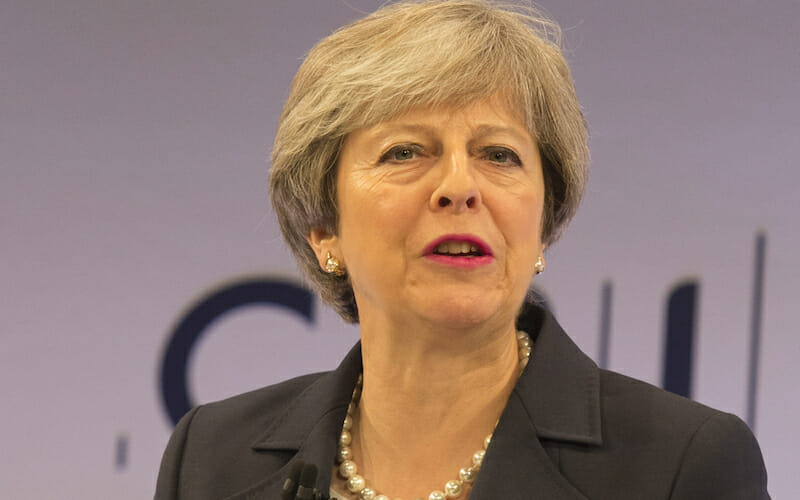
Britain Needs a Policy on post-Brexit Trade
Theresa May’s latest speech on Brexit (at Mansion House on 2nd March) was uselessly contradictory. She speaks on Brexit so rarely as to provoke a welcome response whenever she speaks. Audiences tend to welcome the tag-lines and ignore the main body text, which was unusually long – more than 6,700 words by my count. Some of the positive reporting was more vacuous than the speech, suggesting that the reporters had not read all those words.
The speech was supposed to focus on post-Brexit trade, but she again failed to specify a policy. She wasted most of her words on meaningless platitudes, the rest on contradictions:
Theresa May confirmed that Britain wouldn’t stay in the customs union, but she aimed to keep some industries in (such as aviation) and leave the rest for negotiation. She promised to deliver judicial sovereignty, but committed to accept EU jurisdiction over any institutional cooperation (such as the EU’s regulation of aviation).
May wanted freedom to negotiate freely outside the EU while staying within the EU’s trading block. She wanted “a meaningful independent trade policy” but “the broadest and deepest possible partnership” with the EU. She wanted national control of trade but without “the introduction of any tariffs or quotas.” Finally, she promised both “frictionless” borders and “controlled” borders.
Surprisingly, the press has been inattentive to these contradictions. The first contradiction to receive political criticism was on fishing. Her speech had been hopelessly contradictory on Britain’s fisheries: in one breath, she promised that “the UK will regain control over our domestic fisheries.” In the next breath, she promised “to continue to work together” with the EU “to agree reciprocal access to waters and a fairer allocation of fishing opportunities for the UK fishing industry. And we will also want to ensure open markets for each other’s products.”
In other words, she was promising the Brexiteers sovereignty over fishing waters, while contradictorily offering to trade access with the EU.
The first parliamentary member of her own party to abandon the normative praise was Jacob Rees-Mogg – who effectively leads back-bench Brexiteers, as the new chairman of the European Research Group. Three days after her speech he started briefing the press, urging May to protect British fishing and warning that “the devil will be in the detail as so often.” Another three days went by, and the Chancellor (Philip Hammond) admitted that the government was “open” to trading access to Britain’s fisheries for a deal on some other industry.
May’s government is wasting time and opportunities. Other countries want to make trade deals with Britain, but the membership of the EU legally prevents Britain from doing so.
Most importantly, Donald Trump became US president in January 2017 on a campaign pledge to negotiate a trade deal with Britain, in opposition to Barack Obama’s statement in April 2016, during the referendum campaign, that Britain would be at the “back of the queue.” Trump’s term must end by January 2021, and his critics would like to impeach him earlier. Chances are that the next US president will not be as friendly as Trump, who this week indicated that post-Brexit Britain’s steel and aluminum would not be subject to the tariffs that he is imposing on the EU.
Meanwhile, Saudi officials are in Britain this week wanting a bilateral trade deal, on the explicit promise of acting as a gateway to the Middle East, Africa, and the Islamic world. I am not advocating for a special relationship with the Saudis; I am using the Saudis to illustrate the point that opportunities are out there that May is rejecting in favour of indecision, procrastination, and indulgence towards the EU.
For how long can this go on? May has unnecessarily committed to a “transition period” of at least two years after nominal separation in March 2019 – that’s to March 2021. In effect, May’s transition period keeps Britain in the EU, despite her dishonest claim that Britain is leaving in March 2019. The EU has effectively agreed to a transition deal through 2020 (by declaring that it should not go longer), but May secretly sent officials to suggest a transition period to at least March 2022 – that’s almost six years since the referendum and since she took over as Prime Minister.
It could get worse: in her latest speech at the Mansion House, she repeated her confidence in the “interim agreement” that she signed in December 2017, but this uselessly worded document is still in dispute, most noisily over its implications for the border between Northern Ireland and the Republic of Ireland, not to mention its utterly spineless commitment to pay the EU for the privilege of leaving without specifying the amount, or its irresponsible commitment to keep Britain aligned with European justice on matters to be worked out later.
Her speech ignored these issues, confirmed her commitment to the interim agreement, and repeated her confidence that she could build on the interim agreement to reach a final agreement. She ignored the possibility of separation without agreement (the “no deal” scenario), so she has no leverage, except impossibly contradictory offers that try to please both sides at once but satisfy nobody
This all suggests we’ll be stuck for years more while she “patiently” seeks the “compromises,” while she avoids specificity and while the EU demands specificity through the “transition period,” to as late as 2022, without any final trade deal at all.

